US House of Representatives Speaker Nancy Pelosi arrived in Taipei last night and was reportedly scheduled to meet with President Tsai Ing-wen (蔡英文), legislators and democracy advocates before departing later today.
The speaker departed from Kuala Lumpur yesterday afternoon and touched down at Taipei International Airport (Songshan airport) at about 10:43pm, where she was greeted by Minister of Foreign Affairs Joseph Wu (吳釗燮).
The stop marks the first time in 25 years that a sitting US House speaker is visiting Taiwan.
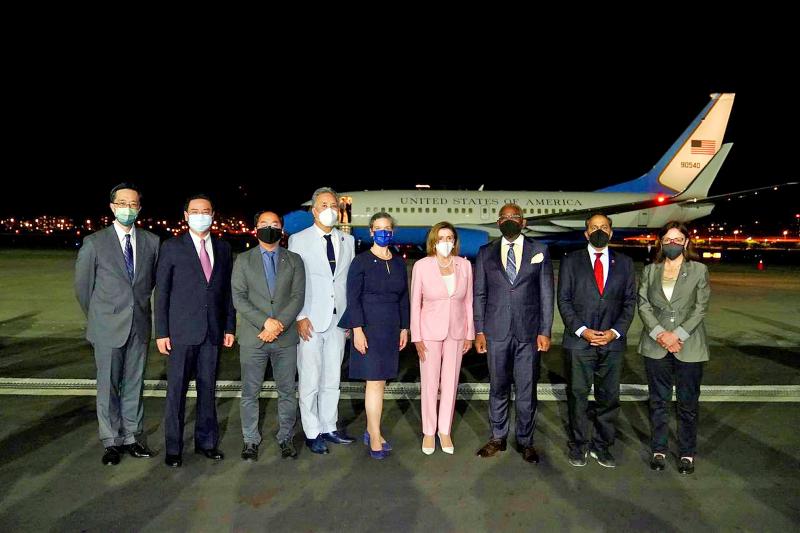
Photo: Lu Yi-hsuan, Taipei Times
Beijing has strongly condemned the visit, with Chinese Ministry of Foreign Affairs spokeswoman Hua Chunying (華春瑩) yesterday warning that the US “will bear the responsibility and pay the price for undermining China’s sovereign security interests.”
Her day is reportedly to start with an 8am meeting with Tsai.
An unnamed source cited by the Liberty Times (the Taipei Times’ sister newspaper) said that Pelosi would meet with lawmakers at a Legislative Yuan reception room at 9am, where she would give a televised public speech before holding a closed-door meeting with caucus conveners of the nation’s four main political parties.
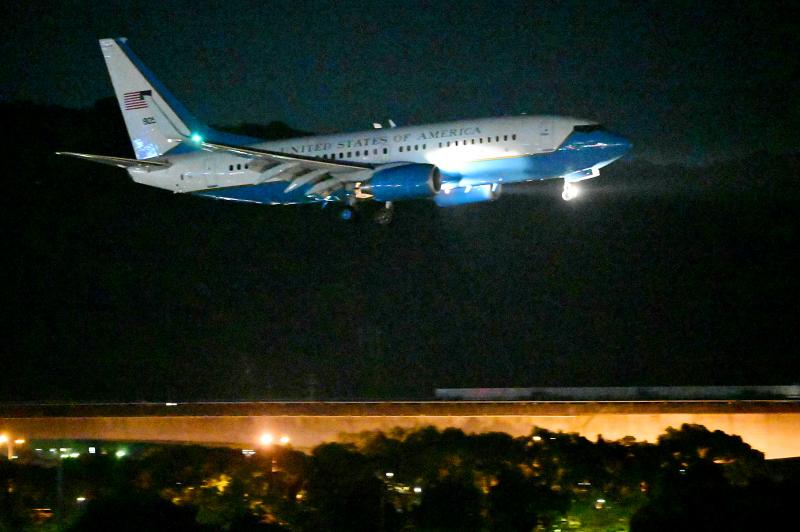
Photo: AFP
Democratic Progressive Party Legislator Lo Chih-cheng (羅致政), who heads the legislature’s Foreign Affairs and National Defense Committee, has also been invited, they said.
Whether Legislative Speaker You Si-kun (游錫堃) — who was in quarantine after testing positive for COVID-19 after returning from overseas — could join the meeting would depend on the result of a rapid test, the source said.
Pelosi’s stop at the legislature would take about an hour, they said, after which she would speak with Tsai again from 10am to 11am at the Presidential Office Building.
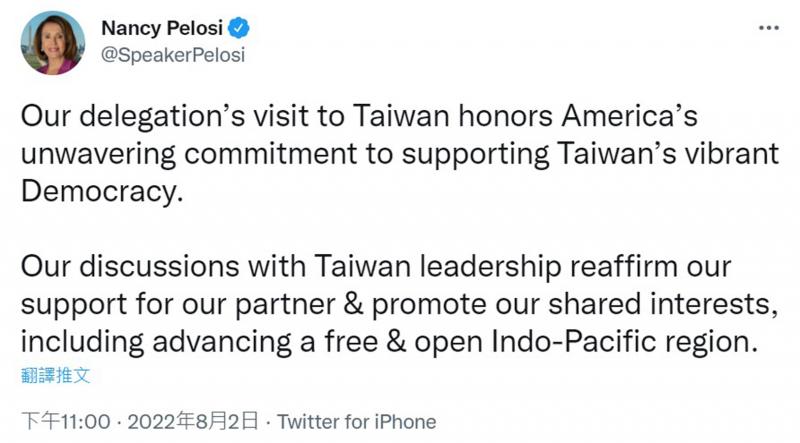
Photo: screengrab from Twitter
At 11am, a news conference was planned at the Taipei Guest House before lunch with Tsai at noon.
Pelosi in the afternoon at Jingmei Human Rights Park in New Taipei City would meet a small group of democracy advocates who are outspoken about China’s human rights record, the Liberty Times reported.
The American Institute in Taiwan has been in contact with Chinese and Hong Kong democracy advocates in Taiwan to arrange for a meeting with Pelosi, the paper said, citing another unnamed source.
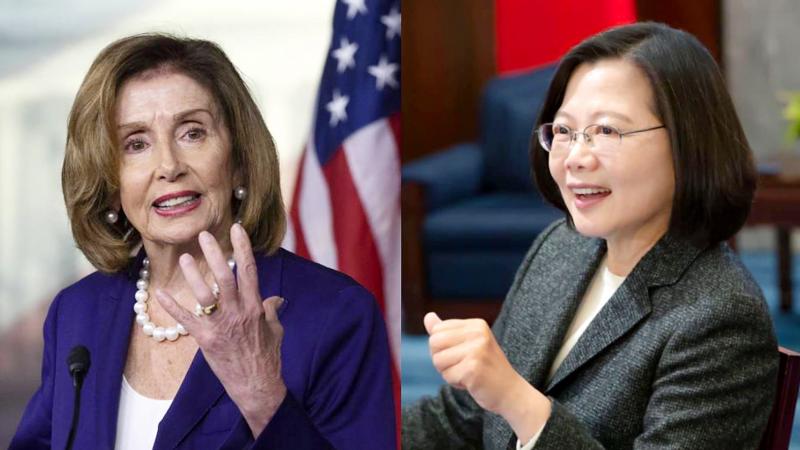
Photo: EPA and the Liberty Times
Lam Wing-kei (林榮基), former manager of Hong Kong’s Causeway Bay Books who was detained by Beijing in 2015, would attend the meeting, the source said, adding that Lee Ming-che (李明哲) — who spent five years in a Chinese prison before his release and return to Taiwan in April — and Wuer Kaixi — a Uighur student leader in the 1989 Tiananmen Square protests — were also contacted.
Lam said that he would visit Jingmei Human Rights Park today, adding that if he did meet Pelosi, he would suggest that the US government help young Hong Kongers leave the territory.
Pelosi is likely to leave Taiwan at about 5pm, sources said.
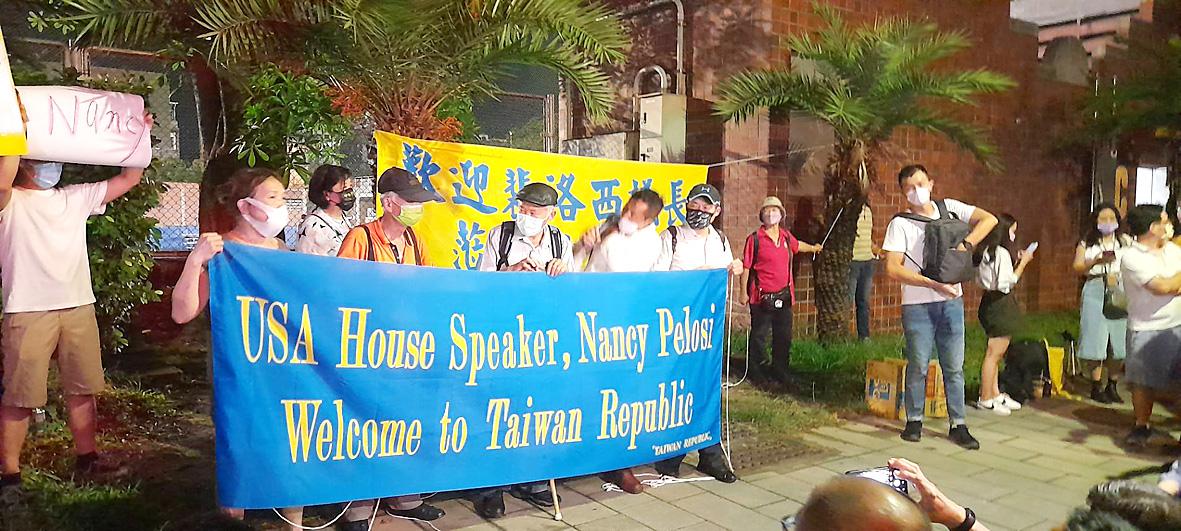
Photo: Jason Pan, Taipei Times
In a statement issued after her arrival, Pelosi said that her delegation’s visit "honors America’s unwavering commitment to supporting Taiwan’s vibrant Democracy."
"America’s solidarity with the 23 million people of Taiwan is more important today than ever, as the world faces a choice between autocracy and democracy," it said.
The statement also noted that hers is one of several congressional delegations to visit Taiwan "and it in no way contradicts longstanding United States policy" guided by the Taiwan Relations Act, the Three Joint Communiques and the "six assurances."
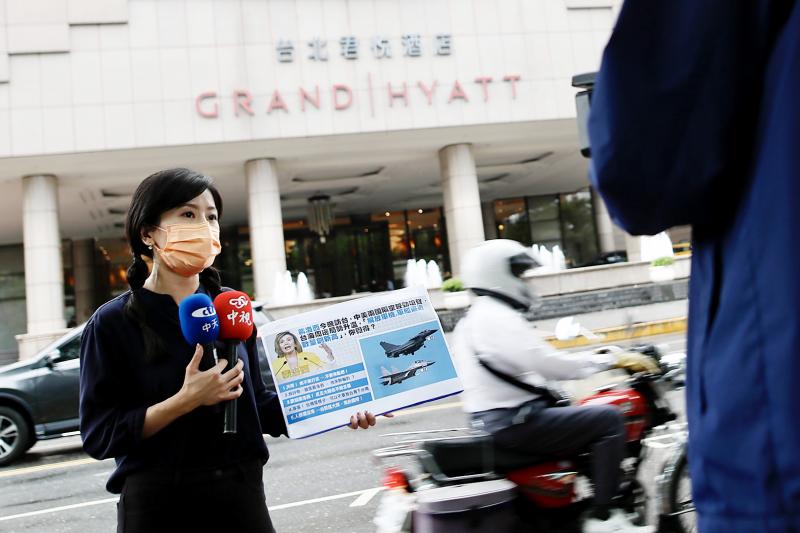
Photo: RITCHIE B. TONGO, EPA-EFE
In Washington on Monday, White House national security spokesman John Kirby said that nothing about Pelosi’s possible trip changed US policy toward Taiwan, and that Beijing was well aware that the division of powers within the US government meant Pelosi would make her own decisions about the visit.
“The speaker has the right to visit Taiwan,” Kirby told a White House briefing.
US Secretary of State Antony Blinken urged China to “act responsibly.”
“If the speaker does decide to visit, and China tries to create some kind of a crisis or otherwise escalate tensions, that would be entirely on Beijing,” Blinken told reporters at UN headquarters in New York prior to her arrival.
“We are looking for them, in the event she decides to visit, to act responsibly and not to engage in any escalation going forward,” he said.
Speaking to Fox News on Monday, former US House speaker Newt Gingrich, who was the last sitting speaker to visit Taiwan in 1997, said that the Chinese Communist Party was unlikely to act on its extreme threats.
“The worst case — if they shot down her airplane, that would be literally an act of war. And we would have no choice except to retaliate massively,” Gingrich said.
Gingrich said that the US and its Indo-Pacific allies such as Australia would not hesitate to strike back, and China would likely face retaliatory attacks and economic repercussions.
“So the Chinese are not necessarily in a strong position to try to bully us. And I think that we need to recognize that,” he said.
The US failing to stand up to “dictatorships” could inadvertently send the wrong message and cause Beijing to push the envelope by trying to occupy Taiwan, he added.
Additional reporting by Chen Yu-fu and agencies

The Central Election Commission has amended election and recall regulations to require elected office candidates to provide proof that they have no Chinese citizenship, a Cabinet report said. The commission on Oct. 29 last year revised the Measures for the Permission of Family-based Residence, Long-term Residence and Settlement of People from the Mainland Area in the Taiwan Area (大陸地區人民在台灣地區依親居留長期居留或定居許可辦法), the Executive Yuan said in a report it submitted to the legislature for review. The revision requires Chinese citizens applying for permanent residency to submit notarial documents showing that they have lost their Chinese household record and have renounced — or have never

A magnitude 5.6 earthquake struck off the coast of Yilan County at 12:37pm today, with clear shaking felt across much of northern Taiwan. There were no immediate reports of damage. The epicenter of the quake was 16.9km east-southeast of Yilan County Hall offshore at a depth of 66.8km, Central Weather Administration (CWA) data showed. The maximum intensity registered at a 4 in Yilan County’s Nanao Township (南澳) on Taiwan’s seven-tier scale. Other parts of Yilan, as well as certain areas of Hualien County, Taipei, New Taipei City, Taoyuan, Hsinchu County, Taichung and Miaoli County, recorded intensities of 3. Residents of Yilan County and Taipei received

Taiwan has secured another breakthrough in fruit exports, with jujubes, dragon fruit and lychees approved for shipment to the EU, the Ministry of Agriculture said yesterday. The Animal and Plant Health Inspection Agency on Thursday received formal notification of the approval from the EU, the ministry said, adding that the decision was expected to expand Taiwanese fruit producers’ access to high-end European markets. Taiwan exported 126 tonnes of lychees last year, valued at US$1.48 million, with Japan accounting for 102 tonnes. Other export destinations included New Zealand, Hong Kong, the US and Australia, ministry data showed. Jujube exports totaled 103 tonnes, valued at

BIG SPENDERS: Foreign investors bought the most Taiwan equities since 2005, signaling confidence that an AI boom would continue to benefit chipmakers Taiwan Semiconductor Manufacturing Co’s (TSMC, 台積電) market capitalization swelled to US$2 trillion for the first time following a 4.25 percent rally in its American depositary receipts (ADR) overnight, putting the world’s biggest contract chipmaker sixth on the list of the world’s biggest companies by market capitalization, just behind Amazon.com Inc. The site CompaniesMarketcap.com ranked TSMC ahead of Saudi Aramco and Meta Platforms Inc. The Taiwanese company’s ADRs on Tuesday surged to US$385.75 on the New York Stock Exchange, as strong demand for artificial intelligence (AI) applications led to chip supply constraints and boost revenue growth to record-breaking levels. Each TSMC ADR represents